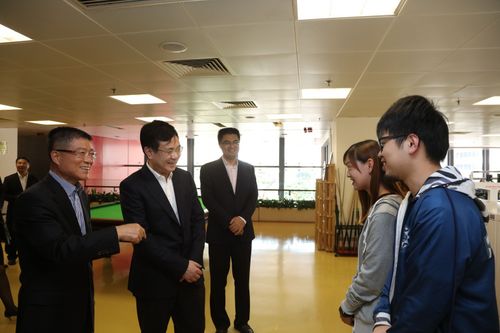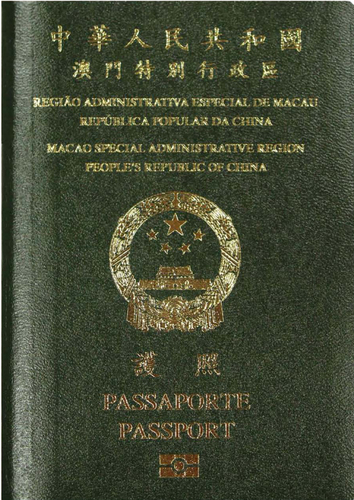Macao SAR Government Portal
News
Taipa-Houses closed on 9 May
Due to special activities, the five buildings of the Taipa-Houses will be closed on Tuesday, 9 May. The entire area including the Avenida da Praia and garden will not be open to the public on the designated day and access is restricted to authorities and specific vehicles. For more information, please call IC through tel. no. at 89884000, during office hours.
…
Company statistics for the 1st quarter 2017
Information from the Statistics and Census Service (DSEC) indicated that both number of newly incorporated companies and total value of registered capital increased year-on-year in the first quarter of 2017. Number of new companies went up by 355 to 1,472 while total value of registered capital rose by 26.6% to MOP155 million. Analysed by industry, most of the newly incorporated companies were operating mainly in Wholesale & Retail Trade (413) and Business Services (369). Companies in dissolution totalled 223, up by 27 year-on-year; value of registered capital of companies in dissolution increased by 7.3% to MOP56 million.
…
Consumer Council conducted specific product price survey on refrigerated, and frozen pork
For the implementation of Section 2b), Article 10, Law 4/95/M of 12 June, Consumer Council conducted its specific price surveys on refrigerated and frozen pork on 5 May. Result of the mentioned survey has been uploaded to the Council’s website (www.consumer.gov.mo).
…
The Deputy-Director of Liaison Office of the Central People's Government in the Macao SAR visits MPI
On 28 April Mr Xue XiaoFeng, the Deputy-Director of Liaison Office of the Central People's Government in the Macao SAR and its delegation visited Macao Polytechnic Institute. Mr. Xue XiaoFeng definitely affirmed the programmes' characteristics of MPI and its science and technology research results. Mr. Xue XiaoFeng also had a short conversation with MPI students and teachers to understand their learning and teaching situation. Xue XiaoFeng encouraged MPI to continue to play an important role for both mainland China and Macao and cultivate more high-end professional talents.
…
Government amends homebuyer mortgage terms to ensure stability in Macao housing market
The Government is to tighten mortgage-lending conditions for both non- first-time resident buyers and non-resident buyers who purchase a residential property or enter into a pre-purchase of an unfinished flat.
…
UM researchers develop new technology for stem cell storage at room temperature for a minimum of 7 days
The University of Macau (UM) Faculty of Health Sciences (FHS) has developed a groundbreaking technology that enables storage of stem cells at room temperature for a minimum of seven days without the loss of viability and biological activities. This new technology does not rely on the traditional cryopreservation method which requires costly equipment and tedious cryopreservation procedures, thus enabling cell storage and transport under ambient conditions. Prof Ren-He Xu, a professor at the FHS of UM, has near two decades of research experiences in stem cells and their medical applications. Under his supervision, his doctoral student Jiang Bin and postdoctoral researcher Yan Li, both from the FHS, engaged in the related research study titled ‘Spheroidal Formation Preserves Human Stem Cells for Prolonged Environment under Ambient Conditions for Facile Storage and Transportation’. Together with the participation of Dr Chris Wong Koon Ho, an assistant professor at the FHS, they achieved success in the development of the new technology. The related paper has been published in Biomaterials, a renowned international journal in the field of biological materials. The study found that preparing human mesenchymal stem cells (hMSC) to form spheroids with the hanging-drop method or other methods can reduce the cell metabolism and increase the cell viability. Stored in a sealed vessel filled with regular culture medium, under ambient conditions without oxygen supply, the viability of hMSC in spheroids remained over 90 per cent even after 11 days. This method is also applicable to higher pluripotent human embryonic stem cells.Stem cells are found in various locations of the body such as bone marrow, blood, brain, spinal cord, skin, and corneal limbus. They are responsible for regenerating and repairing damaged tissues and organs in the body. Transplantation of stem cells can restore damaged tissues and organs to their original functions. For this reason, stem cells have significant clinical value. However, they require strict culturing and storage conditions. Extended exposure (over 24 to 48 hours) to unfavourable temperature, humidity, or levels of oxygen and carbon dioxide will cause the cells to gradually lose their functions and viability. Currently long-distance cell transport mainly relies on cryopreservation, which costs hundreds of, sometimes even one thousand, US dollars. For short-distance transport, cells can be prepared in suspension or adherent culture, but the number of cells that can be transported via this method is limited. Moreover, cell viability decreases dramatically after transport for 48 hours under ambient conditions. The new technology developed by the UM researchers can overcome the above limitations. With this new technology termed spheropreservation, only regular culture tubes and media, which cost only several US dollars, are required for storing and shipping in large quantity probably any type of stem cells and non-stem cells that can aggregate, within a temperature range from 10 ℃ to 37 ℃. With this technology, a sufficient dose of stem cells that are being transported can be used in patients without the need to freeze stem cells before transport and to thaw, revive, and proliferate the transported stem cells.
…
Consumer Council conducts price survey on selling prices of fresh pork and vegetables from Zhuhai and Macao
For the implementation of Section 2b), Article 10, Law 4/95/M of 12 June, Consumer Council on 4 May collects prices of fresh pork from wet markets and supermarkets for consumers’ reference. The mentioned data collected during 26 April to 2 May are used for comparing the average selling price of the same products from Zhuhai. The relevant data has been uploaded to the Council’s website for consumers’ reference.
…
Holders of the Macao Special Administrative Region Passport are granted visa-on-arrival entry to the Republic of Malawi
The Identification Services Bureau has been confirmed by the Embassy of the Republic of Malawi in Beijing that holders of the Macao SAR Passport visiting the Republic of Malawi can obtain visa upon their arrival for a maximum stay of 30 days.
…
Residential price index for the 1st quarter 2017
Information from the Statistics and Census Service (DSEC) indicated that the overall residential price index in the first quarter of 2017 grew by 4.7% quarter-to-quarter to 244.0, with the indices for the Macao Peninsula (245.0) and Taipa & Coloane (239.5) rising by 4.8% and 4.1% respectively. The index for existing residential units (248.7) went up by 5.1%, with the indices for the Macao Peninsula (236.0) and Taipa & Coloane (305.9) increasing by 4.6% and 6.5% respectively.
…
Monetary and financial statistics – March 2017
According to statistics released today by the Monetary Authority of Macao, money supply sustained its growth momentum in March with a stable share of patacas. On the other hand, both resident deposits and loans grew from a month earlier.
…



